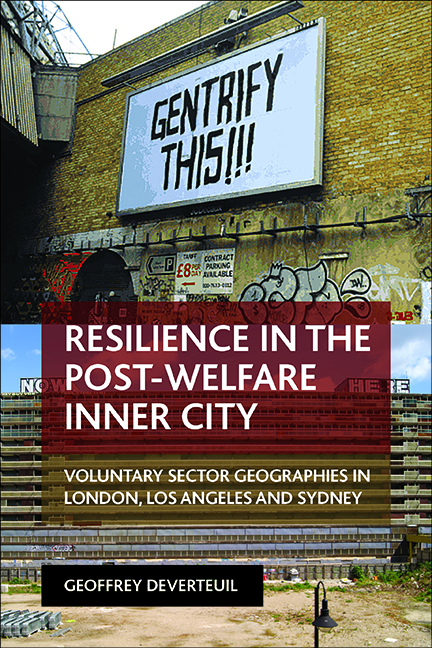 Resilience in the Post-Welfare Inner City
Resilience in the Post-Welfare Inner City Book contents
- Frontmatter
- Dedication
- Contents
- List of tables and figures
- About the author
- Acknowledgements
- Preface
- Part One Introducing resilience in the post-welfare inner city: conceptual and methodological considerations
- Part Two Case studies: spatial and social resilience in London, Los Angeles and Sydney
- Part Three Conclusions, critical resilience, commons and austerity
- References
- Index
twelve - Here, now: recasting service hubs in an age of austerity
Published online by Cambridge University Press: 10 March 2022
- Frontmatter
- Dedication
- Contents
- List of tables and figures
- About the author
- Acknowledgements
- Preface
- Part One Introducing resilience in the post-welfare inner city: conceptual and methodological considerations
- Part Two Case studies: spatial and social resilience in London, Los Angeles and Sydney
- Part Three Conclusions, critical resilience, commons and austerity
- References
- Index
Summary
In this final chapter, I return to lessons generated via the five cornerstones of the book, and then contemplate the transformative promise of service hubs by introducing the notion of ‘commons’. From there, I investigate the emergence of what Peck (2012) called ‘austerity urbanism’, and how this acute version of neoliberalism threatens to corrode some of the resilience of service hubs, particularly in London but also for Los Angeles and Sydney.
Key contributions of the book: returning to the five cornerstones
In terms of thinking about (incomplete) neoliberalism and the (uneven) post-welfare city as the context and threat, my results have shown their chronic and pervasive nature via the vehicle of inner-city gentrification, but also their incompleteness and unevenness that allowed for residual arrangement of bygone eras to prove resilient as well as enable resilience. This confirmed the insights that the post-welfare city always contains the residuals of past structures; what I have shown in great and innovative detail is the struggle around those residuals, the actual means and strategies around this struggle and how they differed comparatively. This missing story around resilience constitutes a key contribution, and further de-essentialises rigid notions of neoliberalism and the post-welfare city.
In terms of resilience, my results have suggested that it is an important if ignored response to displacing threats, and that the interpretation of its production was long overdue. My innovation of the ‘critical resilience of the residuals’ represented a critical co-optation of what can be a regressive, at best status quo, term. It also indicated that the active production of service hub resilience is a crucial element in ensuring the survival of both the voluntary sector and of surplus populations in the gentrifying inner city, ensuring centrality and accessibility. Rather than turn to resistance as a reflex action, we can employ resilience and the intervenient middle as a more realistic approach, especially when dealing with structural shifts (for example, shadow state, shrinking state, devolution) that are difficult to remake, especially for marginal agents. Taken as a defence of previously won gains, the production of resilience surely becomes something as positive as resistance, actively shrugging off pervasive territorial stigmatisation and challenges to ‘staying put’ inherent in the uneven post-welfare inner city.
- Type
- Chapter
- Information
- Resilience in the Post-Welfare Inner CityVoluntary Sector Geographies in London, Los Angeles and Sydney, pp. 239 - 252Publisher: Bristol University PressPrint publication year: 2015


